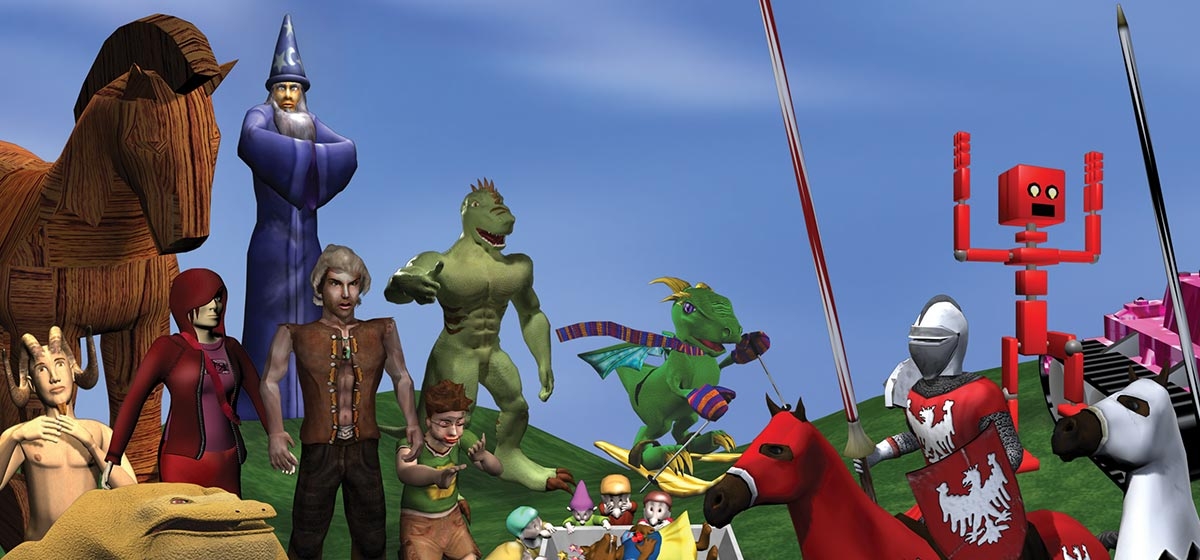Can Video Games Save the World?

The main entrance to the Carnegie Mellon Entertainment Technology Center off Second Avenue looks like the inside of a space ship. Neon blue and purple lamps wash the corridor with cool, luminescent hues, like a Death Star antechamber, and trapezoidal wall moldings recall Star Trek interiors. “Blast door” portcullises, complete with tooth-like eaves ready to crush a storm trooper connect to long corridors on either side.
The man behind the décor of the university’s master’s program in video games and interactive media says it embodies the ethos of the ETC.
“Look, I come from theater, alright?” says Don Marinelli, in the same voice he might use to tell you he grew up in Brooklyn. “Who says where you work needs to look different than where you live? Frankly, we’re doing entertainment technology. If that’s not fun and cool, then I give up.”
Marinelli is a short, stocky man who would be well-cast in a pirate movie. He is the self-styled “executive director” of the ETC and head funmeister. He has wavy, salt-and-pepper hair he wears to his shoulders, a dark mustache and goatee and thick, mischievous eyebrows he uses to punctuate his speech. Marinelli formed the ETC eight years ago with CMU computer scientist Randy Pausch, after they both realized that video games could become the theater of the new millennium. In less than a decade, the ETC has become a leader in training some of the best minds in the field. Video game companies, theme parks and Hollywood studios regularly siphon off the digital artists, programmers and producers who come through Second Avenue. The ETC has campuses in Silicon Valley and Australia, with others planned in Seoul, South Korea and other parts.
More than 30 years after the birth of Pong, there are dozens of undergraduate and graduate programs in video games. The ETC is in front of the pack, says Steve Seabolt, head of brand development for the Sims video games at Electronic Arts, the biggest game developer in the world. Says Seabolt: “It’s the school by which all others are measured. Period.” There are lots of great schools for turning out computer graphics artists, programmers and designers, Seabolt says, “but at a graduate level, they are the school we encourage other schools to look at carefully.”
Working in a medium often maligned for the violent games it produces, Marinelli wants students to break new ground. “Frankly, we’re not interested in ‘first-person shooters’ here,” he says, referring to the genre in which players whack a series of oncoming foes. “We tell our kids here, you better not build them. There’s nothing easier than to destroy. There’s nothing easier than to make nothing but simple plots, with a very clear protagonist — you— and a very clear antagonist — anyone who isn’t you. That’s been done.”
Instead, Marinelli and other faculty at ETC want video games to teach, inform and inspire thought. He sees in video games the same artistic possibilities of cinema, fiction and drama. “The standard line is, can you make a video game that will make you cry?”
Students at the ETC have designed games that simulate hazardous material spills for emergency workers, interactive theater for children with life-threatening illnesses and museum displays that teach American history. Current projects include games designed to teach negotiating skills to Girl Scouts and immunology to junior high students.
Perhaps the flagship of these well-meaning projects is Peacemaker, which challenges players to broker peace in the Middle East. The game debuted in February under the banner of Impact Games, a South Side company co-founded by ETC alums Asi Burak and Eric Brown. Players can choose to play the Palestinian President or Israeli Prime Minister. Every action they take has repercussions. Burak, an Israeli Army veteran with a background in entertainment and business, thought up the game while at the ETC as a sort of interactive version of the news. News by necessity strips events of their context; games have the opposite effect, he says. “People who played it for a few hours said they understood more about how the Middle East conflict behaved than from everything they had read in the news for years.”
Americans spent $13 billion last year on video games, according to the research firm NPD Group; that’s more than movies took in at the box office. Amateur and independently produced video games are enough of a market segment that Microsoft has produced a “home-brew” game-writing software called XNA Game Studio Express. The software giant is hoping to spawn a “YouTube” for video games in the next year or so. Electronic Arts, the Silicon Valley-based industry leader in game development, has been pushing to join the Fortune 500 for a couple of years. The creators of the ETC tailored their curriculum to prepare students for this fast-growing field.
Some games, like the production of a major sports title, require hundreds of people to produce. The ability to work with others, then, is a must. All first-year students take Building Virtual Worlds. In this class, students work on a series of two-week projects in rotating groups of four. By the end of the semester, they’ve worked with 15 other students. Each student gives anonymous feedback on what their teammates were like to work with. It can be a harsh reckoning for some to hear what they’ve been doing wrong. That’s OK, Pausch says. They won’t get this kind of feedback in the real world.
“The only way to stay bad at something is to think you’re good at it,” said Pausch. “If you know you’re bad at it, you’ll try to improve.” Pausch says he beseeched his faculty to be just as blunt with students in their one-on-one evaluations of students.
“Hell” is how one current student described the class.
“Boot camp,” is how Shanna Tellerman remembers it. Tellerman is the 26-year-old CEO of SimOps, an ETC spinoff that makes simulations for emergency workers. “If you’re bad at communicating with others, you get it kind of beaten out of you by the end of the class.”
All of these gauntlets seem to work. Spinoffs like SimOps and Impact Games are sprouting around Pittsburgh. Jess Trybus, an ETC alum and current faculty member, co-founded Edutainment Etcetera with Marinelli three years ago. Based Downtown, its biggest client is Alcoa, which commissioned a simulation game to train workers in forklift safety.
Those who don’t start their own companies have plenty of options after school. Electronic Arts guarantees 10 internships a year for ETC students, an exceptionally high number for the ETC’s class size of 50.
Game developers have taken note. On a recent afternoon, Drew Davidson, the director of the Pittsburgh ETC campus led a rep from a Los Angeles game studio through the studios. They stopped into the fashion designer studio, where a team of students was working on a game that lets a player create an outfit. Peter Justeson, the studio’s 24-year-old “producer,” demonstrated how to add flairs, slits and poofs to a swatch of clothing. The visitor, a 20-something wearing a zip-collar sweater, cargo pants and Vans sneakers, listened politely, then thanked Justeson for his time before following Davidson to the next studio.
Later, Justeson, a rail-thin programmer whose own wardrobe tends more toward Eddie Bauer, explained the game doesn’t elicit much passion from men. “When most guys see it, they say, ‘That’s cool, but who’s going to want to buy this?’ When we show it to women, they’re like, ‘When can I have this?’”
Though sports and action are still popular, video games aren’t just about shooting and racing cars anymore. There are games where players can pretend to be a lawyer, cook soup or feed pets. Nintendo put a game called Brain Age on its latest handheld device, the DS, that appeals to senior citizens trying to stave off senility.
Students at the ETC spend a lot of time discussing these developments and pondering what the future of gaming holds. There are spirited discussions over the relative merits of the Wii, Nintendo’s popular console (“Genius,” says Rich Marmura, 24); Sony’s PSP, a portable console that has largely disappointed; and Second Life, the blockbuster real-time online game played by millions. (In geek-speak it’s an MMORPG—Massively Multiplayer Online Role-Playing Game—or MMO for short.)
In a game-design class this spring, faculty member Jesse Schell, a former Disney Imagineer, asked his students to predict the future of video games. He handed out a worksheet asking: “Who will win the console wars?”, “How many people will be playing MMOs in 2012? 2017? 2022?” He’d just finished a lecture on how technology can change game design. The lecture is peppered with snarky asides about video game busts (a screen shot of Journey, the video game based on the ’80s ballad rocker band, elicits howls of laughter from the students). He tells students to recognize when they’re pursuing a new technology out of simple curiosity or because it has a central use. “Very often, we convince ourselves that these technological things we’re building are useful. We say, ‘Oh, it’s going to help this person, it’s going to make that experience better,’ when really we just think it would be cool to build it. And it’s important to know in your heart when you’re doing that.”
In their ruminations on the future of games, a young man in T-shirt and jeans predicts cell phone makers will be the next big player in game consoles. Schell, pacing at the top of the class, offers a note of caution to that thought. “I am not a believer in convergence,” he says. “My VCR didn’t record radio programs. It could’ve. But it didn’t.”
In addition to Schell, Marinelli has brought in a wide-ranging cast of programmers, artists, musicians and theater veterans to fill out the ETC’s roster. Students even take improvisational acting their first year. This spring, students were able to benefit from the accumulated wisdom of Anthony Daniels, who played C3PO in all six Star Wars movies. Marinelli asked Daniels to lecture at the ETC while the actor was in town two years ago to see C3PO inducted at Carnegie Mellon’s Robot Hall of Fame. With the patented slight figure and smooth English accent (negotiate, to Daniels, is “ne-go-see-ate”), Daniels served as a sort of sci-fi eminence grise to the students for a couple of weeks in March. He gave from-the-hip suggestions on how to make their projects more accessible to audiences.
“They know who I am and what my history is,” Daniels said. “That gives them a willingness to sit for a moment and listen to what I have to say. Of course, if I say stupid things and I’m boring, like anybody else they will switch off.”
Marinelli, whose favorite game is baseball (he’s a Pirates season ticket holder), became interested in video games as a drama professor in the 1990s. He saw a resemblance between games and theater: both involved the construction of imaginary worlds.
The money didn’t hurt, either. “In the theater, all you do is beg, beg, beg. ‘May I please have some money? Can I have a sandwich?’ I saw how in computer science, they just had tons of money coming in. I thought, ‘They need artists, they need creative people, they need artisans, they need wild thinkers. Why don’t we start playing with them?’”
He eventually linked up with Pausch, who was already taken by the siren of virtual reality. Pausch helped design virtual worlds while on sabbatical at Disney. The actor and the computer scientist shared an office for six years, as a kind of interdisciplinary model for their students. Marinelli took over decorating the office, says Pausch, who stepped down from his position at the ETC in early 2006 to pursue other projects.
One of the central tenets of the ETC is that experience is often the best teacher. To kick off the spring semester for ETC-Australia in March, Marinelli took his students on a bus tour of the rolling hills, vineyards and coastline of Southern Australia. The seminal moment, Marinelli says, was a boat tour through the Coorong National Park on the outer banks of the Southern Coast. The group stopped on an island where emus and kangaroos romped between sand dunes.
“Our guide said ‘Hey let’s go digging for cockles,’ and I’m like ‘What the hell’s a cockle?’” Marinelli recalled in his office, which overlooks a bend in the Monongahela. Turns out, cockles are Aussie for clam. The group dug in. “You’ve got 22, 23 people, with their pant legs rolled up, all their shoes and socks off, feet in the sand, getting down there, finding the cockles, smashing them together, and then eating them.
“There was, like, whale blubber from a dead whale over there, and crabs — it was a transcendent moment. They were able to watch each other having glee. They were able to watch each other doing things they’ve never done.”
The students, who will spend their lives thinking up ways to give other people new experiences, had one of their own that day.





